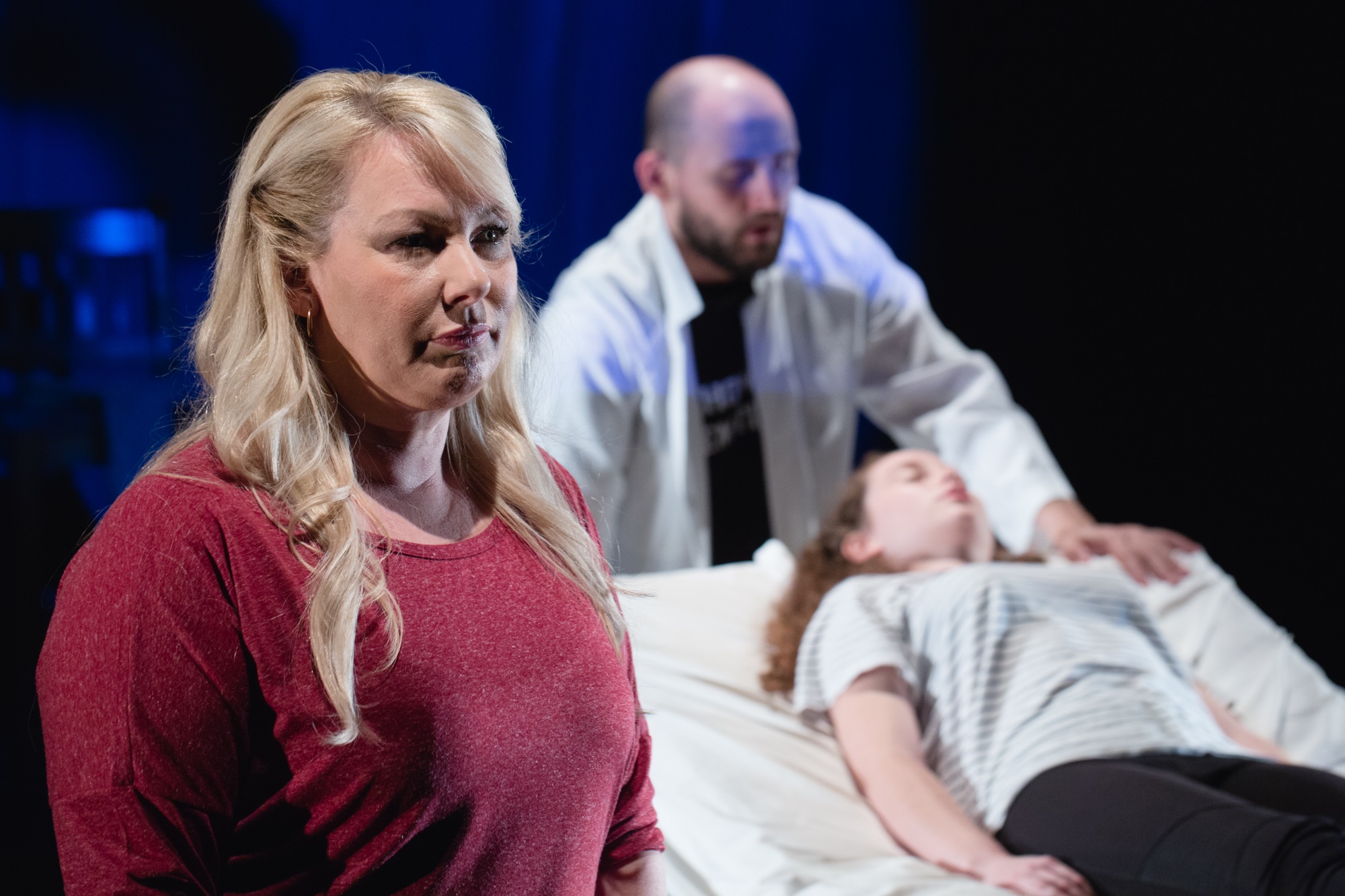The small performance space already made the play feel intimate. When Xan Fraser, facing the audience, said simply, “This is my story,” it felt like all the usual training wheels, flotation devices and emergency handbrakes of suspending disbelief in fiction were gone – we were about to bear witness to the re-enactment of a terrible truth.
Xan Fraser was gang raped when she was just twelve years old. She was plied with alcohol then raped, abused and left on the side of the road for dead. In court, she was asked how tight her jeans were and if she was wearing make-up. At one point in the play, Xan (playing herself) tells the audience, “They say that victims are raped twice. Once by the rapist and then by the system.”
 Project Xan was five years in the making – from the moment director Hellie Turner heard Xan’s interview on 7.30 Report in 2012, to opening night. Hundreds of hours of research were condensed in the PICA Performance Space to a 70-minute challenge to rape culture, toxic masculinity and victim blaming. The play tells Xan’s story and in doing so, attempts to answer why this story needs to be told in the first place.
Project Xan was five years in the making – from the moment director Hellie Turner heard Xan’s interview on 7.30 Report in 2012, to opening night. Hundreds of hours of research were condensed in the PICA Performance Space to a 70-minute challenge to rape culture, toxic masculinity and victim blaming. The play tells Xan’s story and in doing so, attempts to answer why this story needs to be told in the first place.
It takes place in a courtroom, with the word ‘Justice’ sometimes projected in the backdrop. This becomes painfully ironic, as the twelve-year-old Xan (played by Daisy Coyle) is accused of having an STD, agreeing to drink and therefore consenting to whatever was to happen while she was drunk. Because that is how logic works, right? It was gut-wrenching to see her ask the older Xan, “Why? What do they mean?” when the doctors and lawyers would descend into technical terms about a night she couldn’t remember.
Moist poignant, perhaps, was when the judge delivered his verdict, saying “I have never seen a more composed twelve-year-old” – meaning that, since she wasn’t hysterically sobbing, she must not have been at all affected by the gang rape. Younger Xan turned to older Xan, confused, and said, “I was trying to be brave.” The justice system saw a composed victim, indifferent to the traumatic event they have just endured, instead of a complex response to the trauma they had just experienced. Xan just didn’t want her rapists to see her cry. Through moments like this, the play zooms in and out, from the specific instance of Xan’s story, to the wider culture that created it.
Where Turner really triumphs is in how she brings men’s voices into the production. At  one point, Marko (Marko Jovanovic) tells us he is the guy who “laughs at jokes that I know I shouldn’t laugh at”, whilst young Xan skates around him. She stops and looks at him. “Sorry,” he says. At another point, Marko and Siobhan (Siobhan Dow-Hall) are arguing over the explicit lyrics of a rap song, whilst young Xan is sitting on a hospital bed behind them, “Still here,” she says. “I’m only twelve, remember?” She then climbs off of the bed, pushing it off stage by herself.
one point, Marko (Marko Jovanovic) tells us he is the guy who “laughs at jokes that I know I shouldn’t laugh at”, whilst young Xan skates around him. She stops and looks at him. “Sorry,” he says. At another point, Marko and Siobhan (Siobhan Dow-Hall) are arguing over the explicit lyrics of a rap song, whilst young Xan is sitting on a hospital bed behind them, “Still here,” she says. “I’m only twelve, remember?” She then climbs off of the bed, pushing it off stage by herself.
Turner shows that even though it is difficult and ostracising for men to stand up to other men about rape culture, ultimately, they must. It is not up to a young girl to change this culture; to push her own heavy hospital bed out of the scene or, in another scene, to hide in her own house from insults like, ‘slut’, ‘whore’ and ‘bitch’. It is the duty of those who are in the inner circle; those with the power to change it. Even if this means – as the play confronts – risking male friendship, or being seen as ‘no fun’ by their mates. Turner is sensitive to how difficult it is for men to break free of this cycle; but with the wide, innocent eyes of Daisy watching on, the message is clear. Rape is never the burden of the victim to carry, but the burden of collective society that created the conditions that could ever let this happen in the first place.
It is challenging to translate a lived experience to the stage in a way that is both good theatre and authentic. Whilst at times the soundtrack and lighting changes felt out of place, the story and the reasons the story had to be told were all that were needed for strong engagement. Audiences left with tangible ways to combat, rather than be complicit in, rape culture. None of these ideas are new; but the play gave them a new sense of urgency and the audience a responsibility to truly do them justice.
Looking around the audience, I saw theatre-makers, poets and university friends. A bold, unapologetic work for our times, Project Xan is a play for all of Perth.
Review by Katie McAllister
Images by Daniel Grant
Project Xan will be playing at the PICA Performance Space until November 19. Tickets available here.

